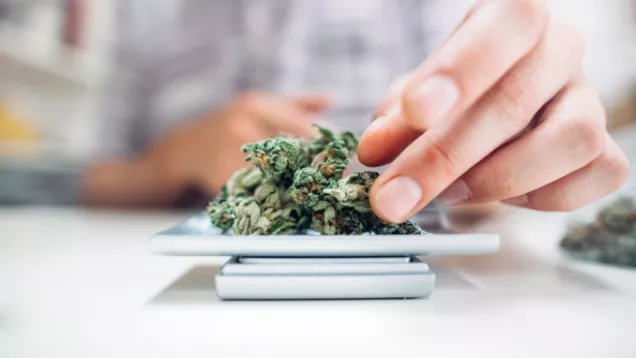On March 13, the Brazil Senate Committee on Constitution, Justice and Citizenship advanced legislation to criminalize possession of any quantity of illicit drugs, effectively removing the blurry line that legally divides personal use from distribution. The proposed constitutional amendment (PEC), introduced by Senator Efraim Filho of the center-right Union Party, comes just one week after the resumption of the Supreme Federal Court (STF) trial to decide whether criminalization of personal possession of illicit drugs is unconstitutional. The STF justices have yet to agree on what amounts would define personal possession.
Under current law, possession of larger amounts is criminalized as distribution and punished with a mandatory minimum of five years in prison. Smaller amounts are frequently punished with incarceration alternatives and “treatment,”but it’s up to police to decide how much is considered larger or smaller, which has resulted in disproportionate prosecution of Black people. One senator who voted in favor of the PEC stated, “Let’s leave it up to the person who makes the seizure and the judge to assess it on a case-by-case basis.”
The PEC doesn’t itself mean more people would be sentenced to prison time. But it’s a reactionary move that seeks to wipe away the category of personal possession, which is the STF trial stands to decriminalize. The trial, which has focused particularly on marijuana, resumed March 6 after a six-month break.
The vote is now five to three in favor of decriminalization, with one more vote in favor needed to end the trial.
It’s been almost nine years since the trial had its initial hearing, and 15 years since it first reached the STF. Internal STF regulations stipulate that the first the rapporteur votes, then the voting proceeds in order, from the longest-serving justice to the most recently appointed.
As was expected, on March 6 conservative Justices André Mendonça and Nunes Marques voted against decriminalization. The vote tally is now five to three in favor of decriminalization, with one more vote in favor needed to end the trial.
Two remaining STF justices, out of a total of 11, have yet to vote, and it’s unclear how they will vote or when. We could have expected a “No” from Flavio Dino, Lula’s former Minister of Justice who was appointed to the Supreme Court by the president in 2023 to succeed Rosa Weber. But as she already voted before stepping down, he isn’t eligible to vote.
Mendonça defended his “No” by making false claims about harms of marijuana use, including increased risk of suicide as well as risks to fetuses when marijuana is used during pregnancy. And, of course, he used the old trope that marijuana is a gateway drug, calling it “the first step towards the precipice,” and conflated decriminalization with legalization—saying that “in practice, we are legalizing use.”
An opponent of home cultivation, he also claimed that a single plant—depending on the growing conditions—can yield up to 600 grams of dried flower. He proposed that the possession threshold be 10 grams, and suggested that the National Congress should come up with definitive threshold within 180 days. It’s difficult to imagine this happening.
Marques defended his “No” vote by appealing to populism and empty legalism. He cherry-picked a few studies to justify false claims about health risks of psychotic disorders and memory loss. He claimed that low-income Brazilian parents do not warn their children about drug use, saying “the main argument that the Brazilian family has” against marijuana is its illegality.
The hearing will now be stalled for at least 90 more days.
STF Rapporteur Gilmar Mendes, along with Justices Alexandre de Moraes, Rosa Weber and Roberto Barroso, all of whom have already cast their votes in favor of decriminalization, believe the threshold should be 60 grams. Marques, along with Cristiano Zanin who has also voted against it, see 25 grams or six female plants as the limit. Mendoca (who voted against) and Edson Fachin, who voted in favor, say that the thresholds must be decided by the National Congress.
At the end of the session, Justice Toffoli, nominated by President Lula during his second mandate in 2009, used the strategy that conservatives have been mobilizing throughout the nine years of the case: He requested further time to review the matter. In this instance, he claimed the reason was that he could not yet determine what the appropriate threshold should be.
Justice Barroso, who currently occupies the presidential chair, voted in favor of decriminalization back in 2015. He noted that “prohibition does not protect public health, it rather compromises it,” and that the drug war had failed. He also underscored the inconsistency in decriminalizing personal possession while still criminalizing other activities like production and sale of drugs, and contended that the legislative branch would eventually need to address this incongruity through potential legalization.
In 2023, after Justice Zanin voted against decriminalization, Barroso admonished him about how criminalization discourages people from accessing hospital care, since hospitals were obligated to report suspected drug use: “If you seek public health care as a drug user, if that is considered a crime.”
The hearing will now be stalled for at least 90 more days. As a glimmer of hope, it falls to Barroso to determine when voting will resume.
Image via City of Los Angeles





Show Comments